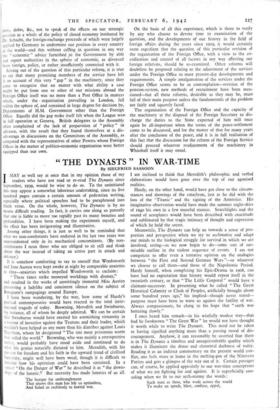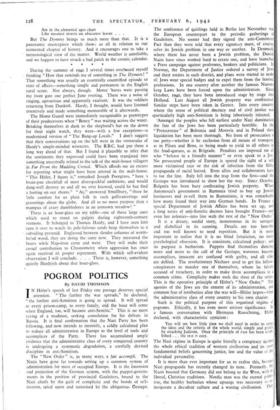" THE DYNASTS IN WAR-TIME
By SIEGFRIED SASSOON
IMAY as well say at once that in my opinion those of my readers who have not read or re-read The Dynasts since September, 1939, would be wise to do so. To the uninitiated this may appear a somewhat laborious undertaking, since its five hundred pages contain a certain amount of pedestrian writing, especially where political speeches had to be paraphrased into blank verse. On the whole, however, The Dynasts is by no means difficult reading. In fact,- it carries one along so potently that one is liable to move too rapidly past its many beauties and profundities. I have been making the experiment myself, and the effect has been invigorating and illuminative.
Among other things, it is just as well to be reminded that what we non-combatants have endured in the last two years was unprecedented only in its mechanical concomitants. ,(By non- combatants I nean those who are obliged to sit still and think about the war instead of taking an active part in attack and defence.) It is somehow comforting to say to oneself that Wordsworth and Jane Austen were kept awake at night by comparable anxieties in t8o5—anxieties which impelled Wordsworth to exclaim:
"These times strike moneyed worldings with dismay," and resulted in the works of unwittingly immortal Miss Austen preserving a ladylike and consistent silence on the subject of Bonaparte's rampagings around Europe.
I have been wondering, by the way, how some of Hardy's poetical contemporaries would have reacted to the total inter- national tragedy of today. Browning, Meredith and Swinburne, for instance, all of whom he deeply admired. We can be certain that Swinburne would have exerted his astonishing virtuosity in a torrent of invective against the Teutons and their leader, which wouldn't have helped us any more than his diatribes ,against Louis Napoleon, whom he designated " The one most poisonous worm that soiled the world." Browning, who was mainly a retrospective writer, would probably have stood aside and continued to do what his genius naturally dictated to him. Meredith, with his passion for freedom and his faith in the upward trend of civilised humanity, might well have been vocal, though it is difficult to imauine how his optimism could have been sustained. In a sonnet "On the Danger of War" he described it as "the down- slope of the lunatic.' But necessity has made lunatics of us all.
The hunger for embranglement That gnaws this man has left us optionless, And haled us recklessly to horrid war. I am inclined to think that Meredith's philosophic and verbal elaborations would have gone over the top of our agonised realities.
Hardy, on the other hand, would have got close to the circum- stances and showings of the cataclysm, just as he did with the loss of the ' Titanic ' and the signing of the Armistice. His imaginative observation would have made the summer night-skies of 1940 his own in a few museful stanzas. Searchlights and the sound of aeroplanes would have been described with exactitude and sublimated by that tragic intimacy of thought and expression of which he held the secret.
Meanwhile, The Dynasts can help us towards a sense of pro- portion and perspective when we try to acclimatise and adapt our minds to the biological struggle for survival in which we are involved, seeing—as we now begin to do—some sort of sur- misable outline in the violent sequence of events. I am not competent to offer even a tentative opinion on the analogies between " the First and Second German Wars "—or whatever we choose to call them—and those of the Napoleonic Period. Hardy himself, when completing his Epic-Drama in 1908, can have had no expectation that history would repeat itself in the twentieth century, or that " The Little Corporal " would have a claimant-successor. In presenting what he called " The Great Historical Calamity or Clash of Peoples, artificially brought about some 'hundred years ago," his implied—though never stated— purpose must have been to warn us against the futility of war. Always compassionate, he clung to his hope that " earth was bettering slowly."
I once heard him remark—in his wistfully modest way—that had he foreknown "The Great War" he would not have thought it worth while to write The Dynasts. This need not be taken as having signified anything more than a passing mood of dis- couragement. Anyhow, it can reasonably be asserted that there is in The Dynasts a timeless and unsupersedeable quality which makes it illuminate the dense and elemental darkness of today. Reading it as an indirect commentary on the present world con- flict, one feels more at home in the melting-pot of the Nineteen Forties and gets a glimpse of the way out of it. Certain passages can; of course, be applied appositely to our war-time conceptions of what we are fighting for and against. It is superficially con- soling when we fit to our arch-enemy the words: Such men as thou, who wade across the world To make an epoch, blast, confuse, appal,.
Are in the elemental ages chart
Like meanest insects on obscurest leaves . . .
But The Dynasts brings us much more than that. It is a panoramic masterpiece which shows us all in relation to our tormented chapter of history. And it encourages one to take a meteorological view of the matter. World weather is unreliable, and we happen to have struck a bad patch in the cosmic calendar,
* *



























 Previous page
Previous page